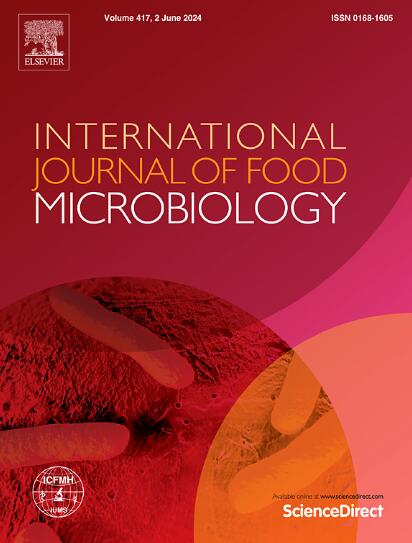Genomic and phenotypic polymorphism of Clostridium botulinum Group II strain Beluga through laboratory domestication
IF 5
1区 农林科学
Q1 FOOD SCIENCE & TECHNOLOGY
International journal of food microbiology
Pub Date : 2024-10-01
DOI:10.1016/j.ijfoodmicro.2024.110927
引用次数: 0
Abstract
Laboratory domestication is the result of genetic and physiological changes of organisms acquired during numerous passages in vitro. This phenomenon has been observed in bacteria as well as in higher organisms. In an effort to understand the impact of laboratory domestication on the foodborne pathogen Clostridium botulinum and related microbial food safety research, we investigated multiple spore stocks of C. botulinum Group II Beluga from our collection, as that is a widely applied model strain used in laboratories over decades. An acquired nutrient auxotrophy was confirmed as thymidine dependency using phenotypic microarrays. In parallel, whole-genome re-sequencing of all stocks revealed a mutation in thyA encoding thymidylate synthase essential for de-novo synthesis of dTMP from dUMP in the auxotrophic stocks. A thyA-deficient Beluga variant stock was successfully complemented by introducing an intact variant of thyA and thymidine prototrophy was restored, indicating that the thymidine auxotrophy was solely due to the presence of a SNP in thyA. Our data suggested that this mutation, deleterious under nutrient-poor growth conditions in a chemically defined medium, has been present and maintained in laboratory stocks for nearly 30 years. Yet, the mutation remained unidentified since receiving the strain, most likely due to routine use of culture conditions optimized for growth performance. This work pinpoints the need for careful monitoring of model strains extensively used in laboratory settings at both phenotypic and genomic level. In applications like food safety challenge tests, compromised strains could cause incorrect predictions and thereby have deleterious consequences. To mitigate the risk of acquiring mutations, we recommend keeping passage numbers of laboratory strains low and to avoid single-colony passaging. In addition, relevant strains should be subjected to regular WGS checks and physiological validation to exclude DNA mutations with potential negative impacts on research data integrity and reproducibility.
通过实验室驯化白鲸肉毒梭菌 II 型菌株的基因组和表型多态性。
实验室驯化是生物体在体外多次传代过程中遗传和生理变化的结果。在细菌和高等生物体中都观察到了这种现象。为了了解实验室驯化对食源性致病菌肉毒梭菌和相关微生物食品安全研究的影响,我们研究了我们收集的肉毒梭菌第二类白鲸孢子种群,因为这是几十年来实验室广泛使用的模式菌株。使用表型芯片确认了一种获得性营养物质辅助营养,即胸腺嘧啶依赖性。与此同时,对所有种群进行的全基因组重测序发现,在辅助营养型种群中,编码胸苷酸合成酶的 thyA 发生了突变,而这种突变对于从 dUMP 中重新合成 dTMP 至关重要。通过引入一个完整的 thyA 变体,成功地对一个 thyA 缺陷白鲸变体种群进行了互补,胸苷原生营养得以恢复,这表明胸苷辅助营养完全是由于 thyA 中存在一个 SNP。我们的数据表明,这种突变在化学定义的培养基中营养贫乏的生长条件下是有害的,它已经在实验室种群中存在并维持了近 30 年。然而,自接收菌株以来,该突变仍未被发现,这很可能是由于常规使用了优化生长性能的培养条件。这项工作表明,有必要在表型和基因组水平上对实验室中广泛使用的模式菌株进行仔细监测。在食品安全挑战测试等应用中,受损菌株可能会导致预测错误,从而产生有害后果。为了降低获得突变的风险,我们建议保持实验室菌株较低的传代次数,避免单菌落传代。此外,应定期对相关菌株进行 WGS 检查和生理验证,以排除对研究数据完整性和可重复性有潜在负面影响的 DNA 变异。
本文章由计算机程序翻译,如有差异,请以英文原文为准。
求助全文
约1分钟内获得全文
求助全文
来源期刊
CiteScore
10.40
自引率
5.60%
发文量
322
审稿时长
65 days
期刊介绍:
The International Journal of Food Microbiology publishes papers dealing with all aspects of food microbiology. Articles must present information that is novel, has high impact and interest, and is of high scientific quality. They should provide scientific or technological advancement in the specific field of interest of the journal and enhance its strong international reputation. Preliminary or confirmatory results as well as contributions not strictly related to food microbiology will not be considered for publication.

 求助内容:
求助内容: 应助结果提醒方式:
应助结果提醒方式:


